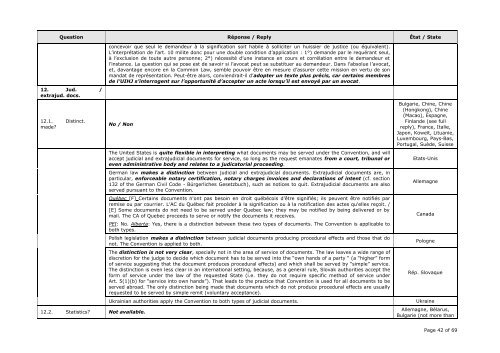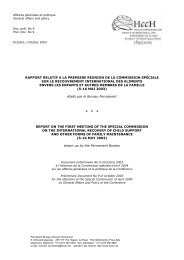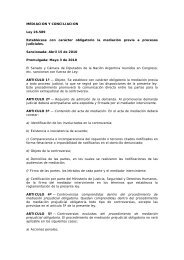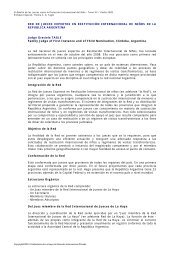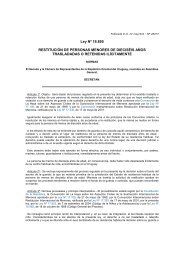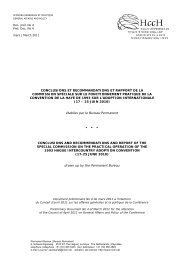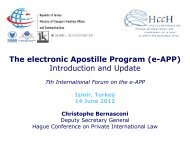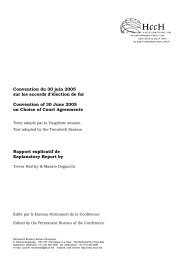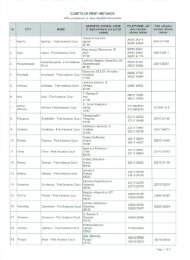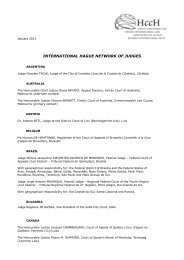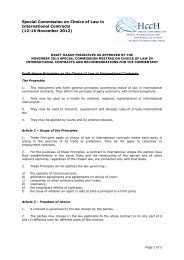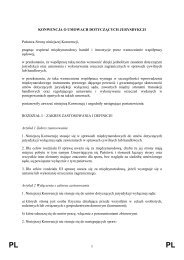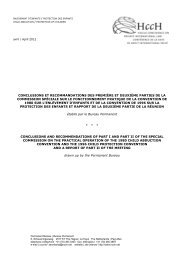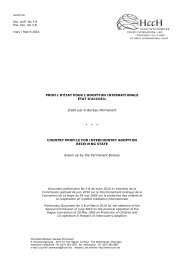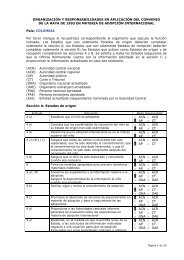aperçu des réponses au questionnaire accompagnant la ... - HCCH
aperçu des réponses au questionnaire accompagnant la ... - HCCH
aperçu des réponses au questionnaire accompagnant la ... - HCCH
You also want an ePaper? Increase the reach of your titles
YUMPU automatically turns print PDFs into web optimized ePapers that Google loves.
Question Réponse / Reply État / State<br />
12. Jud. /<br />
extrajud. docs.<br />
12.1. Distinct.<br />
made?<br />
concevoir que seul le demandeur à <strong>la</strong> signification soit habile à solliciter un huissier de justice (ou équivalent).<br />
L’interprétation de l’art. 10 milite donc pour une double condition d’application : 1°) demande par le requérant seul,<br />
à l’exclusion de toute <strong>au</strong>tre personne; 2°) nécessité d’une instance en cours et corré<strong>la</strong>tion entre le demandeur et<br />
l’instance. La question qui se pose est de savoir si l’avocat peut se substituer <strong>au</strong> demandeur. Dans l’absolue l’avocat,<br />
et, davantage encore en <strong>la</strong> Common Law, semble pouvoir être en mesure d’assurer cette mission en vertu de son<br />
mandat de représentation. Peut-être alors, conviendrait-il d’adopter un texte plus précis, car certains membres<br />
de l’UIHJ s’interrogent sur l’opportunité d’accepter un acte lorsqu’il est envoyé par un avocat.<br />
No / Non<br />
12.2. Statistics? Not avai<strong>la</strong>ble.<br />
The United States is quite flexible in interpreting what documents may be served under the Convention, and will<br />
accept judicial and extrajudicial documents for service, so long as the request emanates from a court, tribunal or<br />
even administrative body and re<strong>la</strong>tes to a judicatorial proceeding.<br />
German <strong>la</strong>w makes a distinction between judicial and extrajudicial documents. Extrajudicial documents are, in<br />
particu<strong>la</strong>r, enforceable notary certification, notary charges invoices and dec<strong>la</strong>rations of intent (cf. section<br />
132 of the German Civil Code - Bürgerliches Gesetzbuch), such as notices to quit. Extrajudicial documents are also<br />
served pursuant to the Convention.<br />
Québec [F] Certains documents n'ont pas besoin en droit québécois d'être signifiés; ils peuvent être notifiés par<br />
remise ou par courrier. L’AC du Québec fait procéder à <strong>la</strong> signification ou à <strong>la</strong> notification <strong>des</strong> actes qu'elles reçoit. /<br />
[E] Some documents do not need to be served under Quebec <strong>la</strong>w; they may be notified by being delivered or by<br />
mail. The CA of Quebec proceeds to serve or notify the documents it receives.<br />
PEI: No. Alberta: Yes, there is a distinction between these two types of documents. The Convention is applicable to<br />
both types.<br />
Polish legis<strong>la</strong>tion makes a distinction between judicial documents producing procedural effects and those that do<br />
not. The Convention is applied to both.<br />
The distinction is not very clear, specially not in the area of service of documents. The <strong>la</strong>w leaves a wide range of<br />
discretion for the judge to decide which document has to be served into the “own hands of a party “ (a “higher” form<br />
of service suggesting that the document produces procedural effects) and which shall be served by “simple” service.<br />
The distinction is even less clear in an international setting, bec<strong>au</strong>se, as a general rule, Slovak <strong>au</strong>thorities accept the<br />
form of service under the <strong>la</strong>w of the requested State (i.e. they do not require specific method of service under<br />
Art. 5(1)(b) for “service into own hands”). That leads to the practice that Convention is used for all documents to be<br />
served abroad. The only distinction being made that documents which do not produce procedural effects are usually<br />
requested to be served by simple remit (voluntary acceptance).<br />
Bulgarie, Chine, Chine<br />
(Hongkong), Chine<br />
(Macao), Espagne,<br />
Fin<strong>la</strong>nde (see full<br />
reply), France, Italie,<br />
Japon, Koweït, Lituanie,<br />
Luxembourg, Pays-Bas,<br />
Portugal, Suède, Suisse<br />
Etats-Unis<br />
Allemagne<br />
Canada<br />
Pologne<br />
Rép. Slovaque<br />
Ukrainian <strong>au</strong>thorities apply the Convention to both types of judicial documents. Ukraine<br />
Allemagne, Bé<strong>la</strong>rus,<br />
Bulgarie (not more than<br />
Page 42 of 69


